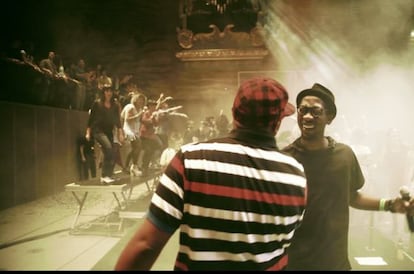Dancing to the beat of a different drum
Documentary ‘Off the Beaten Track’ captures the creativity of African electronica


Tragedy struck less than a year ago. The Lisbon offices of Enchufada, the recording hub of Buraka Som Sistema, burnt down. The group still doesn’t know whether the fire was the result of somewhere trying to hide the traces of a robbery — several computers disappeared — or if it was a punishment inflicted by someone who couldn’t bear the unprecedented global success of a Portuguese project made up of white and African musicians.
The fire wiped out the history of the group in one go. Their music and their documents were backed up, but seven years of memorabilia went up in smoke. At that moment, those made of less stern stuff might have opted to go for the easy money and bow to the mainstream — to make the music more accessible, to accept offers to put themselves at the service of superstars. Although Buraka Som Sistema have refused to enter the world of commercial music, they have already seen what it's like when it's angry.
Shakira wanted to work with us but it was all very impersonal"
"Shakira wanted to work with us but it was all very impersonal. We refused but she didn't care — her producers stole our ideas anyway. Are we going to sue? We don't have a lot of resources and it would mean going up against a record company, Sony, which has also distributed one of our records."
It's not, they say, a matter of them being purists. "We are open to working with people from other fields but, on a human level, they have to be on our wavelength. We're about to bring out a track with La Mala [Rodríguez], for example."
The group are horrified to be reminded of the fact that reggaeton star Don Omar had a hit with a track titled Danza kuduro in 2010. Affable and calm types, they can't help but raise their voices when they remember the video for the song: yachts, mansions, sports cars, semi-naked women... A more thorough adulteration of the kuduro genre would have been impossible.
Kuduro emerged out of the poverty-stricken musseques neighborhoods of Luanda, the capital of Angola, at the start of the 1990s. A combination of international modes of dance music and African and Caribbean rhythms, it inspires extraordinary dancers who hijack movements from martial arts. It's fast and aggressive music that pounds away at 140 beats per minute. And as the name indicates — it translates as "hard-ass" — it also reflects the predominance of the buttocks as an object of desire and a means of expression for the female audience.
For the last two years the members of Buraka have been partaking in a unique adventure: a documentary, financed by the Red Bull Music Academy, that charts their journeys around four continents. Off the Beaten Track, which was presented in London two weeks ago, tells the story of their search for like-minded musicians. Whenever their tour schedule permits, they stop to connect with fellow creators:
'Kuduro' is fast and aggressive, pounding away at 140 beats per minute
"We didn't want an autobiography or an ego trip," they explain.
The juxtaposition of the words of some of kuduro's famous admirers, such as Diplo, Santigold and M.I.A., with the reality of the Third World in the film is revealing: improvised studios ("It's my grandma's house," one African producer explains), fantastic dancers who stop the traffic in the dusty streets, the Portuguese-speaking radio announcer who dubs them Buraka Sound System, as if the English somehow legitimates their success.
It also knocks down myths about pan-African fraternity. About to travel from India to Mozambique, with a layover in South Africa, one of the group's members — Kalaf, an Angolan — is denied entry: he lacks the required visa, even though he won't be leaving the airport in Johannesburg. In the end, they have to fly via Ethiopia.
Off the Beaten Track barely touches on the creative melting pot that is today's Lisbon, which is both a destination for African immigration and a gateway for Brazilian music. "That is already implicit in our name," they explain. "Buraca is a neighborhood of Amadora, a Lisbon dormitory town. There are areas with bad reputations, because of drugs and gangs, but they are bursting with imagination. If you want to see the most incredible hairstyles, in Amadora you can find living architecture, perched atop the heads of many of the women there.
The documentary, a shortened version of which will soon be available on the group's website (www.buraka.tv), closes with an argument in a London pub about the direction their next album should take. In person, they rue the fact that they remain unknown in Spain, despite one of their tracks, Kalemba, going viral under the title Wegue wegue. It seems to be the destiny of Portuguese artists, who work for the international market and ignore Spain — there are some rare exceptions, such as a few Fado musicians and The Gift.
To the band, arguments about borders sound prehistoric. According to Joâo Barbosa, the group’s frontman, who spent a year living in Madrid, “the only valid passport today seems to be money.” He goes on to tell some unprintable stories about Isabel dos Santos, the daughter of José Eduardo dos Santos, who has been Angolan president since 1979. The country’s oil wealth has allowed Isabel to control significant proportions of the Portuguese media, energy, telecommunications, banking and other key sectors. “If she wasn’t the offspring of the kleptocracy, I would say there was poetic justice about the colonies buying up the mother country.”
Tu suscripción se está usando en otro dispositivo
¿Quieres añadir otro usuario a tu suscripción?
Si continúas leyendo en este dispositivo, no se podrá leer en el otro.
FlechaTu suscripción se está usando en otro dispositivo y solo puedes acceder a EL PAÍS desde un dispositivo a la vez.
Si quieres compartir tu cuenta, cambia tu suscripción a la modalidad Premium, así podrás añadir otro usuario. Cada uno accederá con su propia cuenta de email, lo que os permitirá personalizar vuestra experiencia en EL PAÍS.
¿Tienes una suscripción de empresa? Accede aquí para contratar más cuentas.
En el caso de no saber quién está usando tu cuenta, te recomendamos cambiar tu contraseña aquí.
Si decides continuar compartiendo tu cuenta, este mensaje se mostrará en tu dispositivo y en el de la otra persona que está usando tu cuenta de forma indefinida, afectando a tu experiencia de lectura. Puedes consultar aquí los términos y condiciones de la suscripción digital.








































